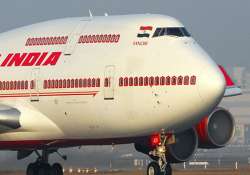Air India may not survive if strike continues, warns AI Chief
New Delhi, Jun 3:As Air India pilot's continued for 26th day, Air India chief Rohit Nandan on Saturday warned that the airline may not be able to survive in the long run if its pilots

New Delhi, Jun 3:As Air India pilot's continued for 26th day, Air India chief Rohit Nandan on Saturday warned that the airline may not be able to survive in the long run if its pilots don't end their strike.
“If the airline has to survive in the long run, achieve the turnaround, it is essential for the pilots to come back,”said Rohit Nandan.
“They (pilots) should think about the long-term impact this strike will have on the airline and their future.”
The losses, according to a senior Air India official in Mumbai, are among the biggest suffered by the airline due to any strike.
“Current load factor (passenger traffic) is at an all-time low for the international segment.
Being the peak travel season, the overall losses will be far above the predicted revenue drain of Rs.400 crore,” said an official of the airline.
“In the peak travel season, international outbounds are highest for us. We have lost a lot of opportunities to cater to passengers going to the US-Europe and Far-East Asian regions.”
The airline expects to stabilise its international operations through the interim plan which it implemented Friday and cut its losses to less than Rs.5 crore a day from the present Rs.10 crore.
The interim plan has axed seven international destinations including Hong Kong, Osaka, Seoul and Toronto.
The Indian Pilots Guild ( IPG), representing aviators of the erstwhile Air India, went on strike May 8 against the move to train their counterparts from Indian Airlines on the soon-to-be-inducted Boeing 787 Dreamliner.
Civil Aviation Minister Ajit Singh Friday again asked the agitating pilots to resume work so that negotiations could held.
“If the airline has to survive in the long run, achieve the turnaround, it is essential for the pilots to come back,”said Rohit Nandan.
“They (pilots) should think about the long-term impact this strike will have on the airline and their future.”
The losses, according to a senior Air India official in Mumbai, are among the biggest suffered by the airline due to any strike.
“Current load factor (passenger traffic) is at an all-time low for the international segment.
Being the peak travel season, the overall losses will be far above the predicted revenue drain of Rs.400 crore,” said an official of the airline.
“In the peak travel season, international outbounds are highest for us. We have lost a lot of opportunities to cater to passengers going to the US-Europe and Far-East Asian regions.”
The airline expects to stabilise its international operations through the interim plan which it implemented Friday and cut its losses to less than Rs.5 crore a day from the present Rs.10 crore.
The interim plan has axed seven international destinations including Hong Kong, Osaka, Seoul and Toronto.
The Indian Pilots Guild ( IPG), representing aviators of the erstwhile Air India, went on strike May 8 against the move to train their counterparts from Indian Airlines on the soon-to-be-inducted Boeing 787 Dreamliner.
Civil Aviation Minister Ajit Singh Friday again asked the agitating pilots to resume work so that negotiations could held.